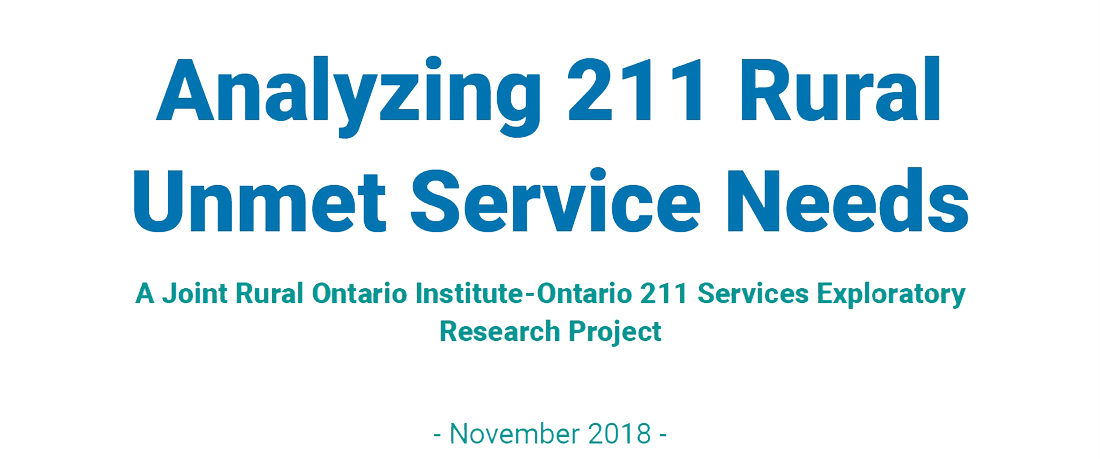
12 Dec Place does matter
Our partners at 211 Ontario have issued this media release:
Place does matter: New report highlights needs and unmet needs in rural communities.
TORONTO, ON, Nov. 29, 2018 – A new report from the Rural Ontario Institute and Ontario 211 Services highlights many differences in how community members access services across urban, rural and remote regions of Ontario. The report stems from an initiative to explore 211 Needs and Unmet Needs data at a community level and understand the value of this information for informing planning and investment decisions about programs and services in Ontario.
“We know that there are people out there who are falling through the cracks,” says Karen Milligan, Executive Director, Ontario 211 Services. “If the data that we collect from callers about their needs, and the barriers to accessing services can be shared with decision-makers, we believe it can have an impact on service delivery planning and investment.”
The project leveraged data collected by the 211 system in Ontario, and explored different questions about what types of needs people using the referral service have. Specifically, the intent was to see how the data might reveal gaps in service in different geographies and if the reasons that needs are unmet are different.
The project engaged a large group of municipal social service managers, local United Ways, provincial Ministries, researchers and social planners. This group of stakeholders provided input into further uses of the data, and other layers of data that might be necessary to answer deeper questions about the reasons for needs not being met.
“We hear from many stakeholders that different types of places need to be supported to develop their own solutions to service delivery challenges because the context is so different depending where you are,” says Norman Ragetlie, Executive Director of the Rural Ontario Institute. “Clearly, in rural places, distances are greater and service providers fewer and farther between. By working with 211, capacity is being built for both local agencies and government organizations to better understand those differences and to respond to them.”
Ultimately, the project identified several themes that would be explored further, such as rural transportation, low-cost dental services, seasonal programs such as utility assistance, school supply programs, holiday programs and more. Project participants from Ontario Trillium Foundation will host an ongoing forum on its website to continue to analyze these and other topics to inform potential solutions for unmet needs in Ontario.
We’ve posted the full report for viewing and downloading here: Analyzing 211 Rural Unmet Service Needs
Click to read the full media release.
Click for additional research impacting Simcoe Muskoka.
_______________________________________________
About ROI:
The Rural Ontario Institute is a non-profit organization committed to developing leaders and facilitating collaboration on issues and opportunities facing rural and northern Ontario.
About 211:
211 is the source Canadians trust when seeking information and services to deal with life’s challenges. 211’s award-winning telephone helpline (2-1-1) and website (www.211ontario.ca) provide a gateway to community, social, non-clinical health and related government services. 211 helps to navigate the complex network of human services quickly and easily, 24 hours a day, 7 days a week, in over 150 languages. 211 service in Ontario is made possible through the support of local United Ways, municipalities and Ontario’s Ministry of Children, Community and Social Services.
Ontario 211 Services is a non-profit agency that governs 211 service in Ontario. They work in collaboration with six Regional 211 Service Providers, and a unique network of data contributors to deliver 211 services though the phone and through online channels to all Ontario residents.
211 Central East Ontario is a UWSM-funded program.



Sorry, the comment form is closed at this time.